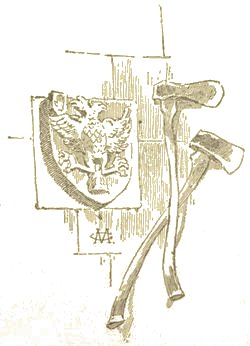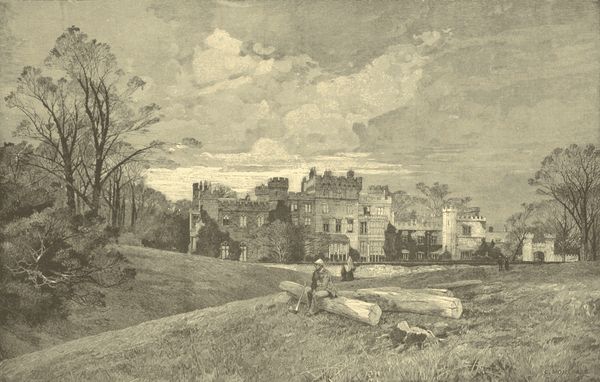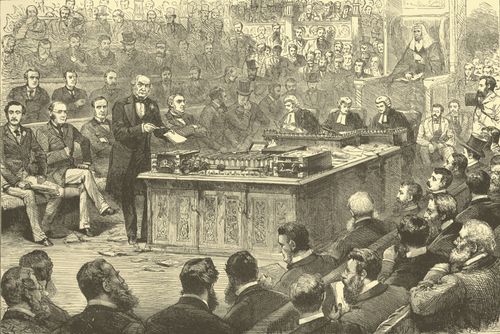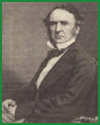 William Ewart Gladstone, born on December 29, 1809, in Liverpool, England, was one of the most influential British politicians of the 19th century. A member of the Liberal Party, Gladstone served as Prime Minister four times between 1868 and 1894, earning a reputation for his commitment to social reform, fiscal responsibility, and Irish Home Rule.
William Ewart Gladstone, born on December 29, 1809, in Liverpool, England, was one of the most influential British politicians of the 19th century. A member of the Liberal Party, Gladstone served as Prime Minister four times between 1868 and 1894, earning a reputation for his commitment to social reform, fiscal responsibility, and Irish Home Rule.
 Gladstone's political career began in 1832 when he was elected as a Member of Parliament for Newark. Initially a Tory, he shifted towards the Liberal Party over time, aligning himself with the principles of free trade, limited government intervention, and individual liberties. His early career was marked by his role as Chancellor of the Exchequer, where he championed financial reforms that reduced taxes and government expenditure, aiming to stimulate economic growth and efficiency.
Gladstone's political career began in 1832 when he was elected as a Member of Parliament for Newark. Initially a Tory, he shifted towards the Liberal Party over time, aligning himself with the principles of free trade, limited government intervention, and individual liberties. His early career was marked by his role as Chancellor of the Exchequer, where he championed financial reforms that reduced taxes and government expenditure, aiming to stimulate economic growth and efficiency.
As Prime Minister, Gladstone pursued a wide range of domestic reforms. His first administration (1868-1874) saw significant changes, including the disestablishment of the Church of Ireland and the introduction of the secret ballot, which aimed to reduce electoral corruption. He also focused on educational reforms, extending schooling to more children and improving the quality of education.
One of Gladstone's most enduring legacies is his advocacy for Irish Home Rule. Believing that Ireland should have greater autonomy, he introduced Home Rule Bills in 1886 and 1893, although both were unsuccessful during his lifetime. His efforts laid the groundwork for future discussions on Irish self-governance.
 Gladstone was known for his principled and moralistic approach to politics, often described as the "Grand Old Man" of British politics. He was a prolific writer and speaker, whose passion for social justice and democracy left a lasting impact on British society.
Gladstone was known for his principled and moralistic approach to politics, often described as the "Grand Old Man" of British politics. He was a prolific writer and speaker, whose passion for social justice and democracy left a lasting impact on British society.
William Ewart Gladstone passed away on May 19, 1898, but his contributions to political reform and his vision for a more equitable society continue to influence British politics. His dedication to public service and his progressive policies solidified his place as one of Britain's most significant political figures.
|



 William Ewart Gladstone, born on December 29, 1809, in Liverpool, England, was one of the most influential British politicians of the 19th century. A member of the Liberal Party, Gladstone served as Prime Minister four times between 1868 and 1894, earning a reputation for his commitment to social reform, fiscal responsibility, and Irish Home Rule.
William Ewart Gladstone, born on December 29, 1809, in Liverpool, England, was one of the most influential British politicians of the 19th century. A member of the Liberal Party, Gladstone served as Prime Minister four times between 1868 and 1894, earning a reputation for his commitment to social reform, fiscal responsibility, and Irish Home Rule.

 Gladstone was known for his principled and moralistic approach to politics, often described as the "Grand Old Man" of British politics. He was a prolific writer and speaker, whose passion for social justice and democracy left a lasting impact on British society.
Gladstone was known for his principled and moralistic approach to politics, often described as the "Grand Old Man" of British politics. He was a prolific writer and speaker, whose passion for social justice and democracy left a lasting impact on British society.




